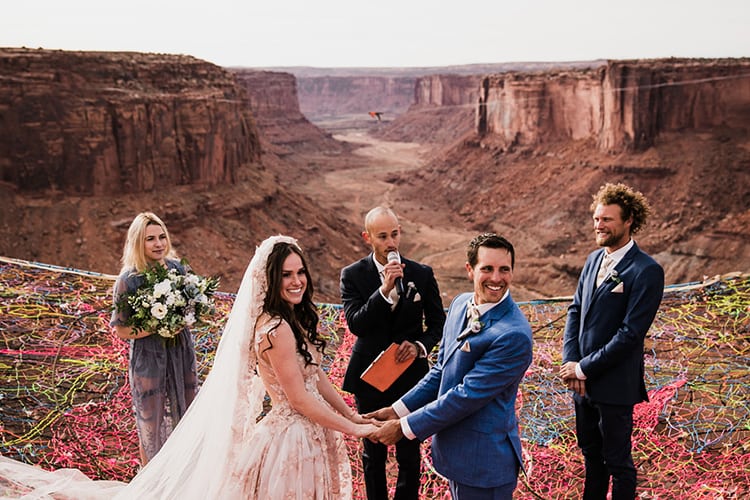
How do you ask her father—a man you barely know, a man who would gleefully skin your butt with a cheese-grater—to fork over $30,000? How do you even begin that conversation?
Hey, Mr. Stevens. [awkward pause.] Should I call you Ted? … Dad? Good to see you. Here’s the thing. As you know, I’m planning on taking your little girl from you, marrying her, and then having all kinds of sweaty, raw, animalistic sex. But I can’t do that alone. To make this wedding and the animal-sex work, I’m going to need your help. We’re in this together! Could you sort of, you know, write me a check for half your annual pension? If you do that, your daughter can buy the wedding dress she’s always dreamed of, and then at the end of the night, I can strip it off and ravage her. Thank you, sir. Thank you…Dad.”
True. It probably won’t be you going to the slaughterhouse and pan-handling her father; your fiancée will take the heat. Even so, you’re still in the crossfire, and you’re still terrified. How do you beg for cash?
There’s a better way. Rather than blurting out embarrassing requests for donations, you and your fiancée should initiate two phases of negotiations. If all goes well, you only need Phase 1. If you still have no clue who’s paying for what, then—and only then—proceed to Phase 2.
Phase 1: Ask Without Asking
One
Think About First Dates
Remember the awkwardness of a first date? At the end of dinner, the check comes and the girl isn’t exactly sure if the guy will pay. She thinks he will. She hopes he will. But it’d be rude for her to bluntly ask, “Are you buying me dinner?” At the end of the meal, if the guy wants to pay, he’ll pay. He’ll open his wallet without being asked. Note: this does not mean that for your wedding you should “wait until the check comes.” Yet the overarching principle holds: if parents want to help pay for the wedding, they’ll usually offer on their own. They just need the right conversation-starter. Which brings us to…
Two
Talk About “Planning,” Not “Paying”
Some handy code-words will let you dance around the “payment question” and still open up the lines of communication. Instead of saying, “How much, if anything, are you willing to contribute?” (ugh) you simply say, “It’s really important to us that we have your input. What parts of the wedding planning do you most want to be involved in?” Involved. It’s a killer word. If the parents want to contribute, when they hear the word “involved,” this is their cue to pipe up. And if not? Then you’ve just spared everyone some embarrassment.
Three
Take Turns on Point
She takes the lead with her parents; you take the lead with yours. Not as obvious as it sounds. Some grooms think that because she’s the bride and it’s her dog and pony show, it’s her responsibility to approach your parents, too. Step up to the plate. Nut up.
Four
Acknowledge the Awkwardness
If the conversation drifts into awkward territory—and it will—the best tactic is to look the tension square in the eye, acknowledge it, and diffuse it with humor. Even saying something dorky like, “Okay, I know this is super-awkward, and I apologize for the weird conversation. [Appreciative chuckles all around the table.] But since we’ll be working together for the next 16 months, we just want to make sure that everyone’s on the same page.”
Phase 2: Hat in Hand
Hopefully, Phase 1 will kick-start the conversation and offer them a chance to pony up cash. If it’s still ambiguous? It’s time to get more explicit.
One
Divide and Conquer
Some couples have decided that in the grand spirit of openness, they should get “all the parties together” for one big monster meeting on who pays for what. Think about it. Do you really think your parents want to divulge how much they can spend—which implies how much they make—in front of near-strangers? This idea is only slightly dumber than rounding up all your ex-girlfriends in a room and asking them to brainstorm, please, on how you can improve your performance in bed.
Two
Think About Their Economic Condition
Before you actually beg for money, think twice about their financial situation. If you and your fiancée haul in a combined $280,000 and her father scrapes by as a plumber, does it make sense to even ask? It may be a better idea to ask for one symbolic financial gesture so that he is filled with pride but not left in the poorhouse: “Dad, it would mean the world to us if you could take care of the cake….” Use your judgment. But assuming everyone’s on (relatively) even financial footing, proceed to…
Three
I’ll Show You Mine, You Show Me Yours
All right. So you’ve cordoned off the sets of parents. You’ve exhausted the Phase 1 diplomacy. It’s time to suck it up and ask the hard questions. Good news: there’s still a more diplomatic way to do it than croaking “How much?” Tell them that you want to discuss financial matters. At the sit-down, come prepared with a spreadsheet that shows how much you and your fiancée are able to spend, and show them your preliminary budget. Tell them you have no expectations—none!—that they will contribute anything, but if they had any plans to help out, then now, for your planning purposes, is the time to discuss it.
Four
Set Expectations
Now you need to switch gears. If they volunteer to contribute and give you a dollar amount, from here on out you must communicate, communicate, communicate. How involved do they want to be? Do they expect final say? Are they comfortable writing you a check now for the blanket amount, or do they insist on separately paying, a la carte, for each and every little item? (Try and avoid this.) Can their $10,000 only be used on the reception, or can you spread it over other costs, too? These questions may be uncomfortable, trust us we know, but we cannot stress communication enough.
And finally….
This isn’t standard “wedding planning protocol.” It’s not in any other book, so it will take them by surprise. If your parents have agreed to help, then get them a gift as a small token of your appreciation—now. Not at the end. Not when they’re expecting it. But right now, right away, right when everyone is still high and happy. A little goodwill goes a long way, even for a dad who’s itching to use that cheese grater.
Next up: learn some basic, big-picture ways to save money.
















